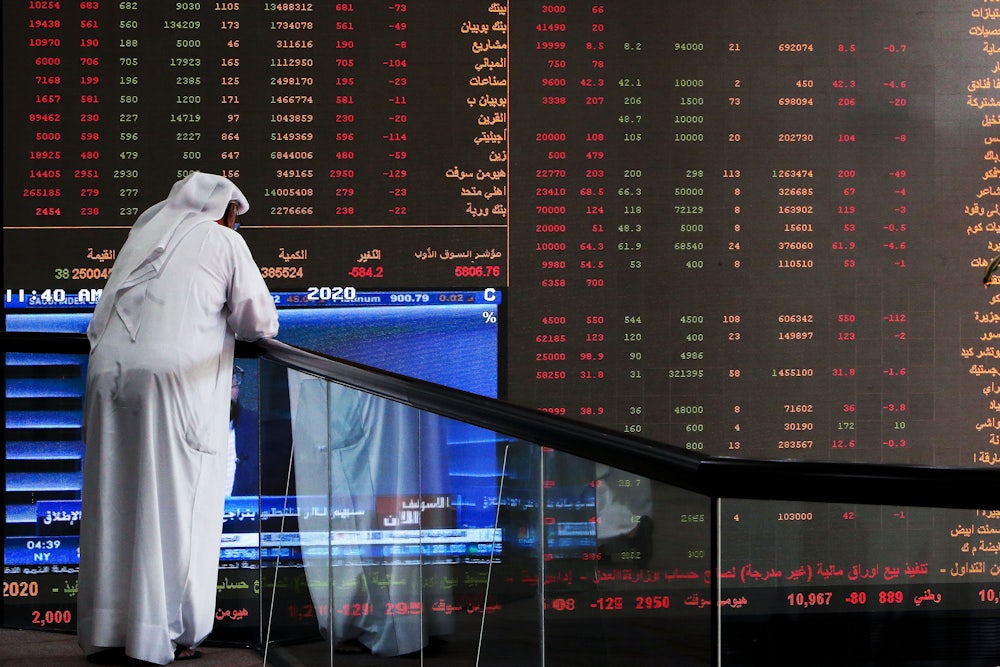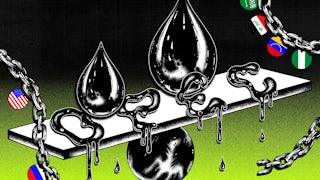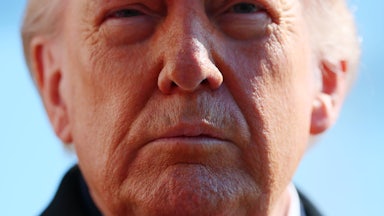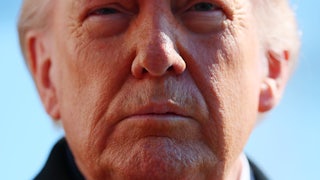President Joe Biden is tapping into about 8 percent of America’s Strategic Petroleum Reserve to stabilize spiraling gas prices, and he’s persuaded Britain, China, India, Japan, and Korea to draw down their reserves, too. This action will be taken, report Zolan Kanno-Youngs and Stanley Reed in The New York Times, “as a challenge” by the Organization of the Petroleum Exporting Countries, otherwise known as OPEC.
But if we’re going to challenge OPEC, why not do so more effectively? Biden should bust this illegal cartel under the Sherman and Clayton antitrust laws that OPEC has been flouting for 60 years.
Crude oil prices, which began this year around $50 per barrel, rose above $80 per barrel in October, the highest price since 2014. People will notice higher retail prices this holiday weekend, and they won’t be happy. Biden’s release of additional oil reserves won’t make much difference; the combined actions of the U.S. and its foreign partners will account for about one day’s worth of global consumption. Indeed, crude prices rose after his announcement, in anticipation that Biden may provoke OPEC to push oil prices as high as $100 per barrel.
Moving to bust OPEC wouldn’t make much difference in the short term, given the slow progress of litigation. But among the limited options in Biden’s anti-inflation toolbox, antitrust action against OPEC is the one that could have the greatest lasting value. The U.S. in the last few years has produced about as much oil as it consumes, but the oil market is global, and OPEC still controls more than 60 percent of all petroleum traded internationally. The environmentally costly fracking boom of the previous decade didn’t change that.
Like all cartels, OPEC increases the cost of the commodity it controls—in this case, oil—by eliminating price competition among producers. If OPEC didn’t exist, you’d pay less at the pump for gasoline—or, if you didn’t, the difference would be collected by the U.S. Treasury in higher gas taxes. In this age of climate change, cheap gasoline isn’t an intrinsic good, but better the U.S. government worry about that than a foreign secretariat situated in Vienna that just wants to maximize profits.
Under U.S. law, OPEC is an illegal organization and always has been. Since passage of the 1974 Antitrust Procedures and Penalties Act, criminal antitrust offenses have been prosecutable as a felony. Get smart with the Justice Department’s Antitrust Division, and you can be sent to prison for 10 years. DOJ routinely enlists Interpol to arrest and extradite foreigners who break U.S. antitrust law. Please follow along silently while I read aloud the Justice Department’s antitrust primer for law enforcement personnel, page 10, “Prosecution of International Cartels”:
Prosecution of international cartels that victimize U.S. businesses and consumers is one of the Antitrust Division’s highest priorities.… The Antitrust Division has been incredibly successful at obtaining jurisdiction over foreign national defendants either voluntarily or by extradition, and since the first foreign antitrust defendant served time in a U.S. prison in 1999, close to a hundred foreign defendants have served prison sentences in the United States for participating in—or obstructing investigations of—international antitrust cartels.
In 2020, anti-cartel enforcement by the Justice Department included the prosecution of 14 people, including Christopher Lischewski, former chief executive of Bumble Bee, sentenced in June to 40 months in jail and a $100,000 fine for fixing the price of canned tuna. (Those mermaids must be very chatty.) Bumble Bee had to pay a $25 million fine, and StarKist, which was in on the price-fixing, had to pay a $100 million fine.
But DOJ lets the biggest fish get away. Individuals have sued DOJ to compel it to prosecute OPEC, but judges have repeatedly thrown these cases out on the grounds that OPEC enjoys “sovereign immunity,” never mind that OPEC isn’t a country, and that even if you chose to consider it one, the 1976 Foreign Sovereign Immunities Act declares commercial activity fair game for prosecution. Courts have also cited “Act of State” doctrine, which says U.S. judges should butt out of disputes involving foreign countries, though that’s supposed to allow prosecution over commercial activity, too.
Congress has tried for two decades to eliminate the sovereign-immunity and Act of State loopholes; in this era of partisan warfare, the No Oil Producing and Exporting Cartels Act, or NOPEC, remains a comforting island of bipartisan consensus. But NOPEC never gets enough votes to pass; it came closest during the administration of oil-friendly President George W. Bush, but Bush killed it with a veto threat. Republican Senator Chuck Grassley reintroduced the latest NOPEC Senate bill in March with Democratic cosponsors Amy Klobuchar and Pat Leahy, and on April 20 a companion bill sponsored by Republican Representative Steve Chabot cleared the House Judiciary Committee on a voice vote. Past supporters of the legislation have included (before they became president) Donald Trump and Joe Biden.
Polite opinion has always snickered at NOPEC as political grandstanding. When Hillary Clinton proposed it during her 2008 presidential campaign, Maureen Dowd called it “inane.” But the serious opposition is generated by the oil companies and by the U.S. Chamber of Commerce. The latter warned in an April letter to House Judiciary Committee Chairman Jerrold Nadler that if the bill were to pass, “the United States and its agents throughout the world could be tried before foreign courts—perhaps including the military—for any activity that the foreign state wishes to make an offense.” But that’s true already (excepting that nonsense about the military). The NOPEC bill would merely clarify existing U.S. law against cartels. If foreign governments wanted to turn the tables, they could try, but the U.S. government doesn’t control production of commodities or set prices for them.
The Chamber noted in its April letter that increased U.S. oil production over the past decade increased our “geopolitical leverage across the globe” and “provided greater insulation against price swings at home,” making NOPEC unnecessary. But that insulation is precisely why now would be a good time to bust OPEC. If the cartel decided to retaliate by cutting production, we’d be far better able to ride it out than at any time in recent memory. What’s the value of global leverage against price-fixers if you don’t use it?
Indeed, the case for busting OPEC has never been stronger. OPEC’s two leaders, Saudi Arabia’s Mohammed bin Salman and Russia’s Vladimir Putin, are a pair of murderous thugs. If busting OPEC distresses them, they can consider it payback. The petroleum economy has entered its twilight years, so we no longer have to fret about long-term consequences. President Biden, meanwhile, has been talking up antitrust actions to curb inflation. Where better to start than OPEC?








